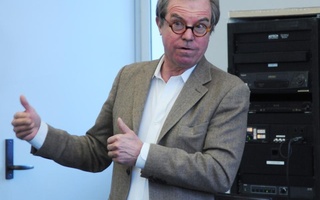The key to world peace is simple.
At least according the founder of the non-profit organization One Laptop Per Child (OLPC), who believes it lies in a tiny green and white computer. Nicholas P. Negroponte, who spoke to a captive audience in the Science Center last night, explained his idea: using technology to revolutionize education in the developing world.
The basic laptop, characterized by its bright yellow hand crank and once described as “enchanting” by Nigerian President Olusegun Obasanjo, was developed by OLPC and is being distributed to school-age children in the world’s 50 poorest countries.
The OLPC laptop, which is marketed to international buyers as a $100 item, actually costs $187 to produce. It is currently sold through OLPC’s Give One Get One Program, which launched Monday through Amazon. For $399, people can buy one laptop and have a second donated to a child in a developing nation.
For many children who receive the laptop, according to Negroponte, their first English word is “Google.”
“I see this as a powerful tool that could transform education in developing countries,” said Calestous Juma, a professor at the Kennedy School of Government, who is also a member of the OLPC Board of Directors.
Juma said he believed yesterday’s event was a chance for Harvard students to get behind the movement of using technology to improve conditions in impoverished countries.
“I think an interesting outcome of this event would be to see how the various student organizations that have sponsored this event can do something substantive,” he said.
Among the sponsoring organizations was the Harvard College Global Hunger Initiative, a new club to which Juma is an adviser. Founded by Eshwan Ramudu ’10 and Sarah H. Nam ’10, the organization hopes to increase agricultural sustainability through technology.
“I think one of the greatest challenges in development is the disparity in technology” between nations, said Nam.
Other campus groups also hope to see students come together on this issue.
“I feel like there’s a lot of territoriality between campus groups, and I believe collaboration is necessary,” said Julia C. Silverman ’10, president of another event co-sponsor, the Harvard College Alliance for Africa (HCAA).
The HCAA is currently collecting used laptops to donate to the New Hope Orphanage in Busia, Uganda. The technology would both educate children and eventually help them find higher-level jobs, according to HCAA Treasurer Charlotte A. Chuter ’10. The HCAA will hold a laptop collection on Dec. 12 and 13 outside Quincy House and in Annenberg.
Negroponte said he hoped Harvard students would get involved by traveling to developing nations during the summer to distribute the laptops.
David M. Sengeh ’10 is already organizing a trip to his native country of Sierra Leone to hand out the computers to children there.
“Illiteracy in Sierra Leone is 70 percent,” said Sengeh. “If we want to keep in line with Nicholas’s 20-year education plan, we need to start reducing the 70 percent.”
His plan may be ambitious, Negroponte said, but he remains optimistic.
“The 20-year plan is world peace. The 15-year plan is to eliminate poverty,” he said. “But the five-year plan is to really see 100 percent of the children in primary education.”
Read more in News
Harvard To Honor Ted KennedyRecommended Articles
-
Lamont To Get Wireless EthernetHarvard College Library (HCL) and Harvard Arts and Sciences Computing Services (HASCS) will initate wireless ethernet services on their laptop
-
Scientists Needed In Policy PositionsScience and technology experts should join economists in holding top government policy-making positions, according to a report released Thursday by
-
Scientists Needed In Policy PositionsScience and technology experts should join economists in holding top government policy-making positions, according to a report released Thursday by
-
Obama Expected To Appoint Harvard Prof. as Chief Science AdviserPresident-elect Obama named Harvard physicist John P. Holdren as his chief science adviser, the Kennedy School announced Friday, marking the
-
 'One Laptop Per Child' Founder Recalls Challenges
'One Laptop Per Child' Founder Recalls Challenges













